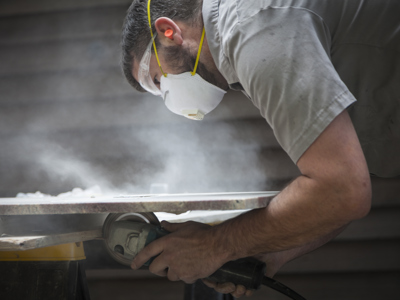48-year-old father of two, Ryan Fenton worked as a stonemason for L & C Transformations Limited, trading as Granite Transformations in Ipswich between around 2016 and 2024.
Granite Transformations made kitchen worktops from engineered stone, commonly known as quartz, which contains
respirable crystalline silica, or silica dust which is known to cause silicosis. Ryan says his job was to use an angle grinder to cut slabs, making room for sinks and hobs and so the stone could fit the dimensions of customers’ homes and businesses.
He remembers the work was “very dusty” and that the extraction systems which should have removed the dust, were “ineffective”.
Ryan also remembers that despite wearing the masks, as he was advised to by his employer, they did not prevent him breathing in silica dust. He also says that his clothes, hands, face and hair were often left coated in silica dust from the work.
Medical records show that in December 2022, Ryan suffered a transient ischaemic attack, what’s known as a mini stroke and tests went on to reveal an issue with his lungs.
Because of his role as a stonemason, Ryan was referred to specialists at the Royal Brompton Hospital, who diagnosed him with silicosis. They told him that the condition was related to his work with engineered stone.
NHS England says that the cause of silicosis is “inhaling large amounts of crystalline silica dust”. It advises that once inside the lungs, the dust causes swelling and gradually leads to areas of hardened and scarred lung tissue. It warns that lung tissue scarred in this way doesn't function properly. There is no cure for silicosis because the lung damage cannot be reversed.
Experts at the Royal Brompton Hospital say that they advised Ryan, that he should, if possible, stop working with engineered stone to slow the progression of the disease.
Ryan says he “felt forced” to stop working as a stonemason to “save his life”. He has moved into adult social care, which has meant an annual pay cut of around £8,000.
Ryan said:
"It is a massive blow that, just because my job involved cutting engineered stone worktops, I have had to give up well-paid work that I enjoyed. It is disappointing that I was allowed to work in these conditions with a product known to have the potential to be so dangerous. I am lucky that I was diagnosed early enough to give myself a better chance of avoiding developing a much worse condition, but I am very worried that others out there work in similar conditions and face the same dangers. I want to share my story because action needs to be taken to stop people working with engineered stone in these hazardous conditions. I don’t want other people to have to go through the turmoil of having to give up their job and worrying about what the future holds for them.”
In February 2025, a Letter of Claim was sent to L&C Transformations Limited, which under personal injury guidelines, has three months to fully investigate and respond.
“It is deeply concerning that as result of the conditions my client alleges he was subjected to whilst working with engineered stone, he has had to take the difficult decision to give up a job he enjoyed. He now faces an uncertain future because of his condition. No-one should be forced to take such decisions and face such uncertainty simply because they go to work. We remain deeply concerned that, without action being taken to address the dangers of working with engineered stone without adequate protection, more and more people will be placed in Ryan’s situation.”





